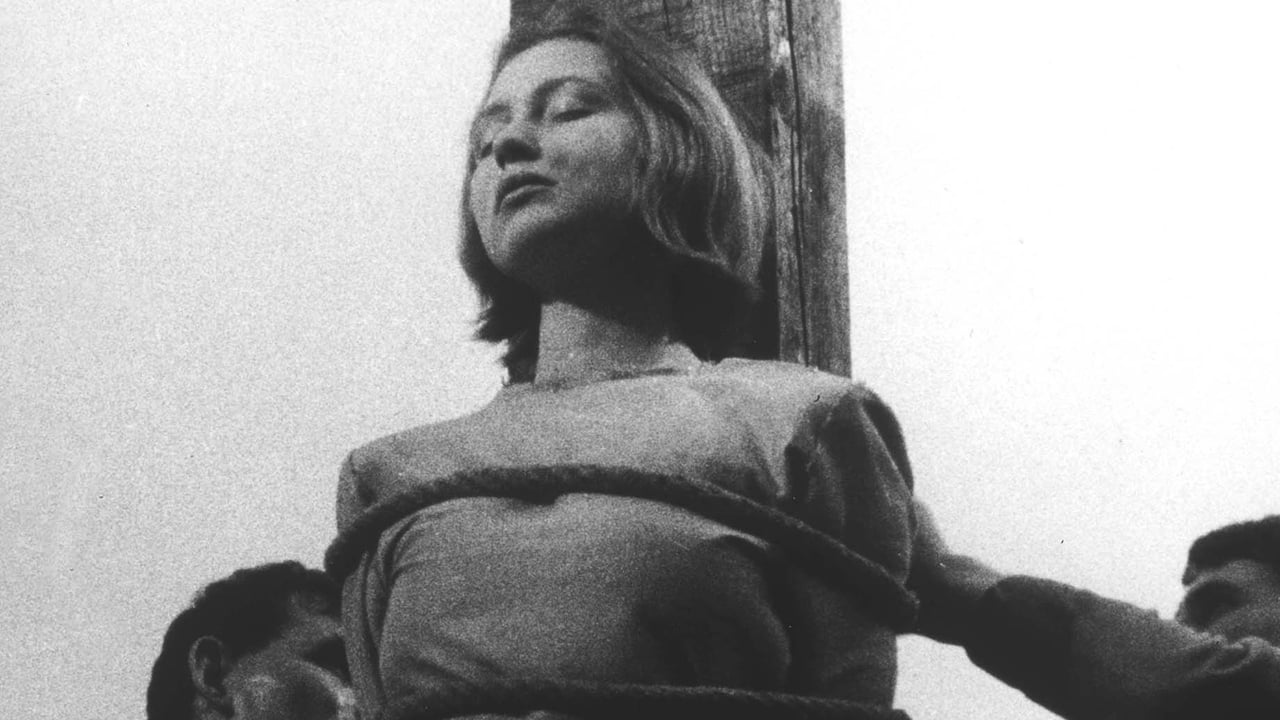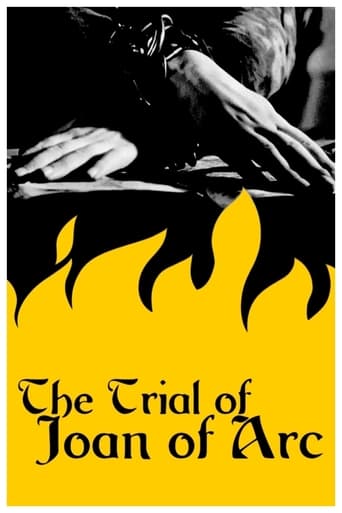

What a waste of my time!!!
... View MoreBrilliant and touching
... View MoreAwesome Movie
... View MoreClose shines in drama with strong language, adult themes.
... View MoreThis is the one Bresson allegedly made in response to Dreyer, though not sure if that was the real impetus or something said along the way to mark intentions. I can see how the project would appeal greatly to him; like his three previous ones, it's about an idealistic youth faced with a world that stifles the spirit. He must have felt it so apt that he could use actual transcripts of the trial kept by the notaries at Rouen.He films the trial as a process of facts, no flourish allowed anywhere, sparse and all the other things you'll read in comments, and all this as asceticism that purifies the eye, or so it goes. Dreyer's Joan was assailed by passions so overwhelming they escaped the body to rend the cinematic air. Huge contrast with Bresson's who is stoic and dispassionate, the air is static, everything is kept in body.One specific impetus behind the project I believe may hav been how to have the portrait of this woman, induce as much deliberate poverty of expression, and still give us a soul? He does it I think. He gives us a Joan who is indomitable, but also afraid, proud without losing her sweetness, glimmers of unsure innocence through the armor of god. He's gifted with a woman as marvelous as Dreyer had.It was an ongoing project for Bresson that stretched back several films, he surpasses them here in complete austerity. He was probably a happy camper looking back.But more than any individual film, it's his philosophy of purity that I feel is worth examining, and I'm in the middle of a few posts where I grapple with it. He was writing along the way a book that delineates this philosophy. It was seeing quotes from this book for years that prompted me to follow up on the films, it was something I've always had in the back of my mind tied to personal observations about emptiness and purity. I won't have conclusions before Balthazar, which is next in line, and probably the one after, but there is something to say here.We say that Bresson is pure, but if you look up close, there's a method. It's one of timing and blocking exact pieces, this extends from the camera to the actors, who become pieces to be moved. What he's doing is that he's taking the language of film and breaking it down to the most basic grammar. I see this as both an intellectually barren project to pick, why all your work will just be simplifying, and it sets you down a slippery slope where the only thing purer is is simple.Bresson makes a lot out of the importance of stillness, but at the center I perceive another notion; he writes that he wants nothing false, nothing that the eye doesn't see. It's a grammarian's insistence on what is true, or seems so at this point, a dogmatist's claim on reality. How about all that we don't see but can feel move through us? He deliberately mutes this in the actors.And in the film we have what? A young girl who is full of inner things she feels, god or madness it's the same courage for her, faced with a cadre of clerics who set out to disprove it all as impure, the devil's work. What's happening during the trial is that these dogmatists are trying to corner Joan into saying that she saw what the eye doesn't see, the abstract in the world of senses, which is what Bresson is working against.(From a Christian view, it would be heretic to say that the divine was bound thus and so, and you were privy of that form)Were the saints clothed? Did St. Catherine have her hair down?Grammarians of spirituality. Now the task is open. More interesting than the actual films for me is this battle in Bresson, between the grammarian of spirituality with his fixed notions on the divine and Joan who wants to preserve the truth of what she felt. Is the world full of presence? Balthazar is up next.
... View MoreI think this film warrants a 6 or 7 in my mind. I have been introspective about this film for a wee while; in many ways, it's almost as if Joan was there - a sturdy, studiously determined and plagued 19 year old (in Dreyer's version it said she was 19, though this could be ascribed by Dreyer as to the response rather then the reality). I bought the artificial eye version in Fopp at a relatively good price. Robert Bresson whose work I'm unfamiliar with, bestowed upon the film a versimilitude, but was it overall as good as one hopes? You can see Bresson was heartfelt in his interpretation, but he couldn't sustain my interest for the ephemera of length. Of course, I can't seem to see Bresson's film as underrated, but I can see that it's heavily overlooked as a new look on the trial.This one took itself seriously to the point of a docudrama. Its documentary-esque nature make it seem alien and detached from me and I think it was the approach that startled me. However this was my gut reaction; the film has Florence Delay portraying Joan in one of the best portrayals you'll see off her. Although the acting can feel stilted and the dialogue exchanges can feel artificial, it's Bresson's Costume Designers and so forth that give this Joan a feeling of authenticity. In some ways it feels ungodly brutal. For example, when Joan passionately wields the cross, she's nearly unceremoniously tripped up by one of the onlookers. Her feet look as if they waded right through the filth.The references to St. Matthew and Catherine can feel really genuine and at the same time this is what the documentary needs is a stance. I finally seen that Bresson was a historian on the matter and this is why the film detracts from many other fictitious films. A study is seen of Joan from a peep hole where one of the vouchers observe her. In Dreyer's obviously we see the man with the crown and that come straight out and accentuate himself, this one keeps cool and in the background.There's also a brutal scene where it's as if by rape that Joan has no sacrament and with the confession in this film, there's no play on objects shaped like some kind of psychoanalytical force from Germany, but rather an actual plea for the truth.Bresson's film may be disingaging and a very unlikely film to be made, but I feel that this intepretation rings more true then any other exegesis of the book. That's a purity that could be seen as overlooked here. At the opening title sequences, we pretty much digest so much already, that the trial itself, on film, feels almost unnecessary. But the fact he done it should mean it's not meant to be avoided by any cineaste. You won't feel, you won't think, you won't bite your nails - you will be deadpan and firm. Bresson said "I want the critics to feel my films and not to think about them intellectually on first viewing". Well one can't help, but think during this film and one can't feel anything. What I can tell from the experience is that you will understand the pain and you will understand the essence of the trial
... View MoreShe was fighting to keep the English out of France, which the English kept invading in hopes of seeking the French throne, which they were never to do. (Hope springs eternal, I guess). The English were the terrorists; they once invaded Scotland killing tens of thousands of men, women and children in a rage because the Scots refused to let Henry VIII's son, Edward VI, marry Mary, Queen of Scots. Joan was protecting France; if not a saint (whom the Church did not recognize as such for 500 years) then she was a fighter whose only sin was being a woman and encouraging the French to defeat the hated English who bled their (English) treasury dry in order to gain the French throne.This is a wonderful picture with the dialogue from the actual transcript. (Also see La Passion de Jeanne d'Arc, made in 1928, which covers the same territory and uses the actual transcript which is brilliantly done and leaves me crying at the end.Some background is in order to understand Joan/Jeanne and what she was fighting for and the king was a wimp.
... View MoreHere's what I saw: a confused teenager (it may be misleading to call a nineteen-year-old woman a teenager, and who knows what being nineteen meant in the Middle Ages) trying hard to cut a fine figure, and succeeding better than most - which is to say, not very well. Bresson lets us know she IS inspired, she DOES court supernatural influence, probably God's, but somehow this doesn't change anything. It's clear Joan is as clueless as everyone else of her era. Sweet, but clueless.This film is only just over an hour long, and although the trial meanders - no-one really knows what he or she is doing - there's no sense of padding. It's a swift, clean, beautiful fable. I'm not sure it has a point: if it does, it lies in the short sharp shock we get at the end. All that legalistic fuffing around and then something decisive and fantastic happens. Very few films can suddenly introduce fantasy at the end and get away with it: this is one; "A Canterbury Tale" (1944) is another. Although Bresson's film is less ambitious, and succeeds partly because it gives itself little opportunity to set a foot wrong, it's still quite a feat.
... View More